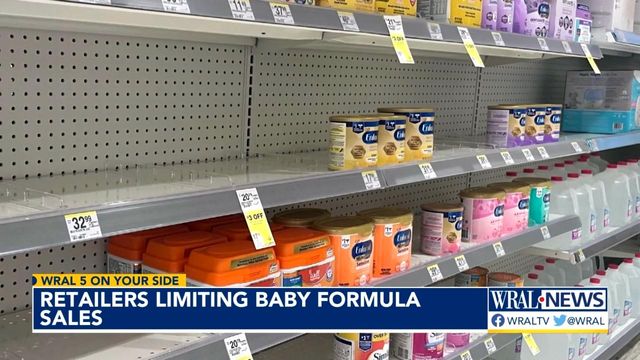Tips for NC parents struggling during baby formula shortage
North Carolina parents are doing everything they can to get baby formula, as families continue struggling with formula shortages due to supply chain issues and a recall.
Earlier this year formula, produced by Abbot Nutrition was linked to illness and two deaths, triggering a recall.
Parents across the state have started taking measures to try and procure baby formula – setting up Google alerts, asking for help on social media and even enlisting friends and family to help search store shelves.
The North Carolina Department of Health and Human Services tells WRAL’s 5 On Your Side that some standard baby formulas are becoming more widely available for users of the state’s WIC program, which supplies food to low-income mothers and young children. However, more specialized formulas are still hard to come by.
Over 30% of the national baby formula inventory was out of stock in April, up from 23% in January and 11% in November last year, according to Datasembly, a consumer products data analytics firm.
Some major retailers continue to limit how much formula can be purchased at a time.
The shortages are causing strain on mothers like Sarah Schrodt, who gave birth to her daughter Magnolia Kate prematurely. Schrodt tried to breastfeed her baby, but struggled due to a previous health condition – so her doctors switched her to formula.
Initially, Schrodt didn’t have to worry about shortages because Magnolia Kate’s formula was specialized and it wasn’t impacted. But as supply of standard formula dwindled, other families started buying hers up – and Schrodt had to get strategic.
“My dad has a Google alert and Ebay alerts for the formula that he checks religiously,” she says.
If you’re struggling to find formula you can set up similar alerts and have companies let you once an item is back in stock.
Something else to try is crowd sourcing for help. Schrodt and many others have taken their struggle to social media.
“When I posted about it, I feel like a lot of people stepped in and wanted to help,” she said.
"I don’t think there’s going to be an overnight solution," says Dr. Jonathan Seigel, a Neonatologist at WakeMed in Raleigh.
Right now, he says their supply is okay, and they’re trying to spread the wealth to other providers.
“The folks here are spending a lot of time helping the folks in the outpatient setting,” he explains.
He suggests calling your pediatrician, who might have better access to formula.
Seigel also told 5 on Your Side things that parents should avoid doing:
- Do not dilute formula in an attempt to 'stretch' it out.
- Do not use goat or cow's milk in place of formula.
- Do not use friend or family member's breast milk as a supplement.
Here is more guidance from the DHHS:
WIC is the Special Supplemental Nutrition Program for Women, Infants and Children that provides healthy food and health care support for low-income families. For infants enrolled in the program, WIC provides assistance to cover the cost of specific milk- and soy-based infant formulas in the first year of life.
The standard milk-based or soy-based powder formulas that WIC covers are widely available in the retail marketplace at this time. However, if WIC participants are having trouble locating formula should contact their local WIC agency for assistance.
A few tips and best practices to help all families navigate these challenges include:
- Community organizations, reputable online retailers, distributors, and manufacturers are sources for finding formula.
- Families using a combination feeding of breast milk and iron-fortified infant formula may wish to consider increasing the frequency of breastfeeding or pumping to decrease the amount of formula needed. Families participating in WIC may also contact their local WIC clinic for additional breastfeeding support and possible breast pump issuance.
- If an infant has been prescribed a specific formula and the availability of safe products is limited, families should work with the child’s health care provider to determine the best feeding plan.
- Families are strongly advised to not use homemade formula and not to add extra water when mixing formula. Families are also advised against using cow’s milk before a child’s first birthday. These practices can be harmful to infants.
- Families needing help with formula costs who have not applied for assistance are encouraged to learn more about WIC and apply online here or FNS (formerly known as food stamps) here.













